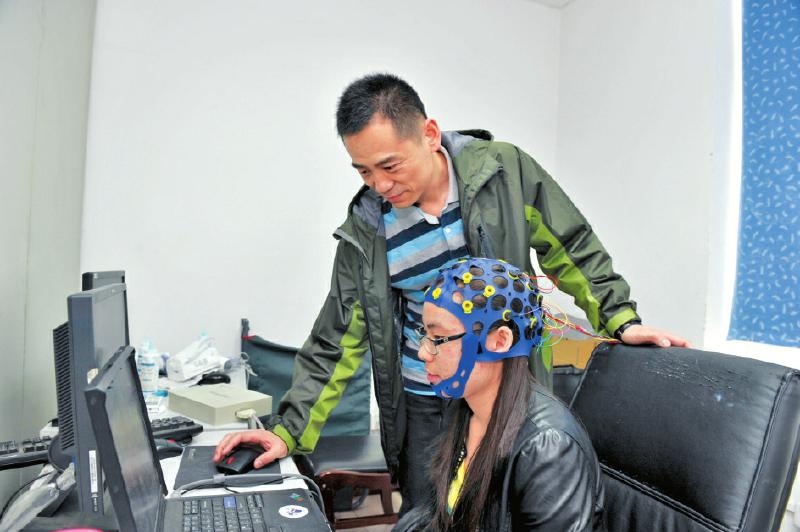International Collaboration Leads to Insight on Human Behavior and Cognition

Diankun Gong, standing, works with a participant playing a video game as part of a study. Weiyi Ma of the U of A and Gong are studying human behavior and cognition.
Weiyi Ma, an assistant professor in the school of Human Environmental Science, is interested in how humans behave and develop. He and his colleague Diankun Gong, a researcher at the University of Electronic Science and Technology in Chengdu, China, approach this research topic in an unusual way — through studying video game players.
Ma and Gong began working together in 2013 at the Key Laboratory for Neuroinformation at the UEST, where Gong is currently a researcher in the area of cognitive neuroscience. Ma left China for Australia in 2014, and he started his role as an assistant professor at the U of A in 2017, but the two maintained their research collaboration.
"Gaming is a big part of our modern way of life," explained Ma. "Worldwide, 2.2 billion people spend 3 billion hours per week. In our research, we use video gaming as a medium to study human behavior in a digitized world."
In order to study how the human brain responds to video games, Ma, Gong and their colleagues at the Key Laboratory use behavioral measurements and technology such as electroencephalogram, or EEG tests, and magnetic resonance imaging, or MRI. They compare the effects of gaming on the brains of expert gamers to the effects on amateurs who have less prior exposure to video games. Using these techniques, Ma and Gong have shown that video games affect the brain in many different ways, including effects on white and gray matter, neural plasticity and visual selective attention.
Currently, the two researchers are studying what happens when habitual gamers reduce their time playing video games. They are also investigating whether oxytocin, a hormone known to increase empathy and generosity, can help people collaborate more effectively in a digital environment.
Ma explained that this field of research has applications for many different fields. For example, research has found that sports games have similar effects on sensory development as physical participation in sports. Video games could also be useful in the field of rehabilitation and communication disorders, as therapy tools to help patients increase communication and motor skills. At the University of Arkansas, Ma collaborates with researchers in psychology and music cognition.
Topics
Contacts
Camilla Shumaker, director of science and research communications
University Relations
479-575-7422,
camillas@uark.edu
Headlines
PetSmart CEO J.K. Symancyk to Speak at Walton College Commencement
J.K. Symancyk is an alumnus of the Sam M. Walton College of Business and serves on the Dean’s Executive Advisory Board.
Faulkner Center, Arkansas PBS Partner to Screen Documentary 'Gospel'
The Faulkner Performing Arts Center will host a screening of Gospel, a documentary exploring the origin of Black spirituality through sermon and song, in partnership with Arkansas PBS at 7:30 p.m. Thursday, May 2.
UAPD Officers Mills and Edwards Honored With New Roles
Veterans of the U of A Police Department, Matt Mills has been promoted to assistant chief, and Crandall Edwards has been promoted to administrative captain.
Community Design Center's Greenway Urbanism Project Wins LIV Hospitality Design Award
"Greenway Urbanism" is one of six urban strategies proposed under the Framework Plan for Cherokee Village, a project that received funding through an Our Town grant from the National Endowment for the Arts.
Spring Bike Drive Refurbishes Old Bikes for New Students
All donated bikes will be given to Pedal It Forward, a local nonprofit that will refurbish your bike and return it to the U of A campus to be gifted to a student in need. Hundreds of students have already benefited.




